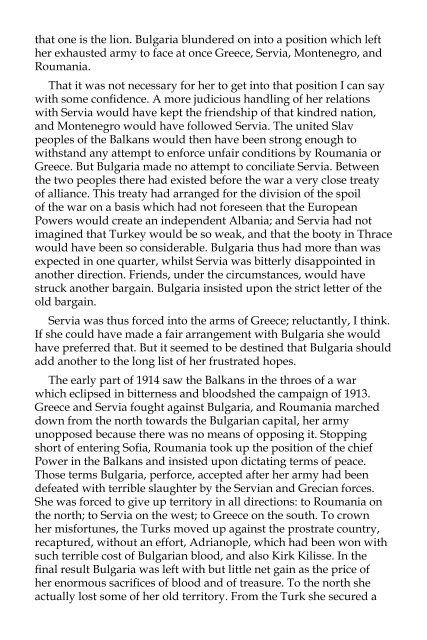Bulgaria e-book - iMedia
Bulgaria e-book - iMedia
Bulgaria e-book - iMedia
You also want an ePaper? Increase the reach of your titles
YUMPU automatically turns print PDFs into web optimized ePapers that Google loves.
that one is the lion. <strong>Bulgaria</strong> blundered on into a position which left<br />
her exhausted army to face at once Greece, Servia, Montenegro, and<br />
Roumania.<br />
That it was not necessary for her to get into that position I can say<br />
with some confidence. A more judicious handling of her relations<br />
with Servia would have kept the friendship of that kindred nation,<br />
and Montenegro would have followed Servia. The united Slav<br />
peoples of the Balkans would then have been strong enough to<br />
withstand any attempt to enforce unfair conditions by Roumania or<br />
Greece. But <strong>Bulgaria</strong> made no attempt to conciliate Servia. Between<br />
the two peoples there had existed before the war a very close treaty<br />
of alliance. This treaty had arranged for the division of the spoil<br />
of the war on a basis which had not foreseen that the European<br />
Powers would create an independent Albania; and Servia had not<br />
imagined that Turkey would be so weak, and that the booty in Thrace<br />
would have been so considerable. <strong>Bulgaria</strong> thus had more than was<br />
expected in one quarter, whilst Servia was bitterly disappointed in<br />
another direction. Friends, under the circumstances, would have<br />
struck another bargain. <strong>Bulgaria</strong> insisted upon the strict letter of the<br />
old bargain.<br />
Servia was thus forced into the arms of Greece; reluctantly, I think.<br />
If she could have made a fair arrangement with <strong>Bulgaria</strong> she would<br />
have preferred that. But it seemed to be destined that <strong>Bulgaria</strong> should<br />
add another to the long list of her frustrated hopes.<br />
The early part of 1914 saw the Balkans in the throes of a war<br />
which eclipsed in bitterness and bloodshed the campaign of 1913.<br />
Greece and Servia fought against <strong>Bulgaria</strong>, and Roumania marched<br />
down from the north towards the <strong>Bulgaria</strong>n capital, her army<br />
unopposed because there was no means of opposing it. Stopping<br />
short of entering Sofia, Roumania took up the position of the chief<br />
Power in the Balkans and insisted upon dictating terms of peace.<br />
Those terms <strong>Bulgaria</strong>, perforce, accepted after her army had been<br />
defeated with terrible slaughter by the Servian and Grecian forces.<br />
She was forced to give up territory in all directions: to Roumania on<br />
the north; to Servia on the west; to Greece on the south. To crown<br />
her misfortunes, the Turks moved up against the prostrate country,<br />
recaptured, without an effort, Adrianople, which had been won with<br />
such terrible cost of <strong>Bulgaria</strong>n blood, and also Kirk Kilisse. In the<br />
final result <strong>Bulgaria</strong> was left with but little net gain as the price of<br />
her enormous sacrifices of blood and of treasure. To the north she<br />
actually lost some of her old territory. From the Turk she secured a<br />
fragment of Thrace, and a part of Macedonia which gave her access<br />
to the Aegean Sea, but no decent port there, and no possibility of<br />
carrying out her grandiose scheme of canalising the River Maritza<br />
and making a <strong>Bulgaria</strong>n Adrianople a port for trade. Further, she<br />
had the mortification of seeing all three of her rivals in the Balkans<br />
aggrandised, and Roumania left with the hegemony of the Peninsula.<br />
Only a few months before, Mr. Noel Buxton had written the “Io<br />
triumphe” of the <strong>Bulgaria</strong>n cause:<br />
The blight that had lain on the Balkan lands was healed, the fog<br />
dispelled. Even the prestige of military despotism was gone like a<br />
pricked bubble. The tyranny that rested on delusion and not on power<br />
was vanished like an empty nightmare that fades when the sleeper<br />
wakes. The establishment of Europe’s freedom was fulfilled; the final<br />
step taken. A great and notable nation had obtained recognition through<br />
the war. Its persistence, its purpose, its deep reserve, now stood revealed,<br />
added to the world’s stores of national character.<br />
For centuries the <strong>Bulgaria</strong>n refused to compromise with the Turk.<br />
Other nations sought to lighten the weight of the yoke by taking service<br />
with the tyrant or bowing the head. The maxim, “The sword never<br />
strikes when the head is bowed,” undermined the soul of other nations,<br />
never of this. Influence and wealth went to others; all seemed lost by the<br />
policy of defiance. <strong>Bulgaria</strong>ns would not balance advantages. A kind of<br />
faith made them ready to pay even death for ultimate gain. The spirit<br />
wins at last: and the indomitable spirit of the Bulgars has come by its just<br />
reward.<br />
Three months after that the Turk was back in Thrace, and the<br />
national life of <strong>Bulgaria</strong> had touched its lowest point since the war of<br />
Liberation, with only her justified hope in the future as a consolation.





